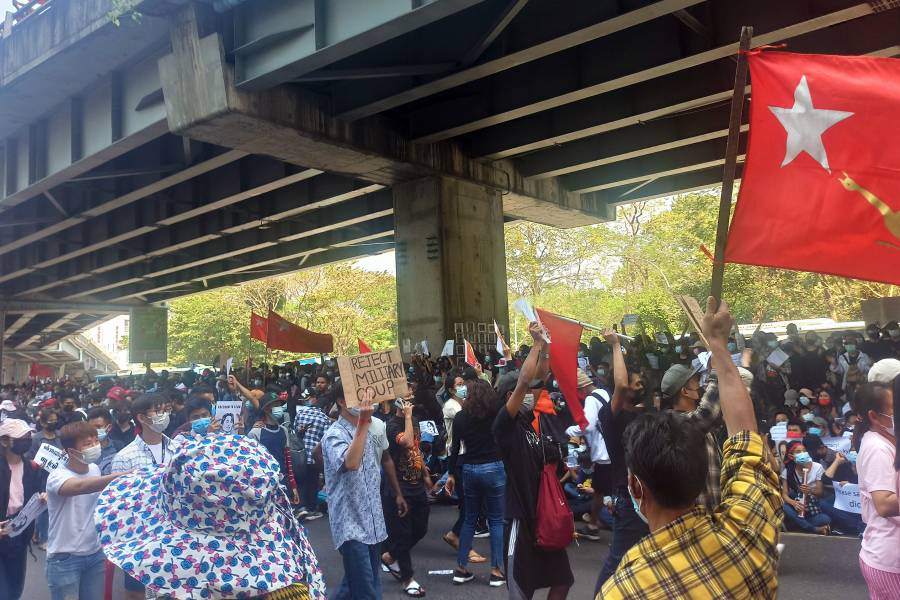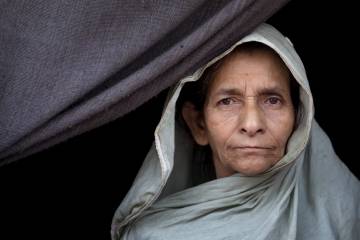After sweeping the democratic elections in November, Myanmar's National League for Democracy was ousted from power during a pre-dawn coup d'état last Sunday, just hours before the new parliament was set to be sworn in. Since then, the country's military proxy party, the Union Solidarity and Development Party, has detained NLD party ministers, including the nation's de facto leader, Aung San Suu Kyi.
November's elections marked only the second time that Myanmar civilians have democratically elected their leaders, after decades of military junta rule. Dramatic anti-military demonstrations unfolded over the weekend across the Southeast Asian country, and The New York Times reports that hundreds of thousands of Myanmar citizens, many clad in red or bearing the crimson flag of the NLD party, have mobilized in spite of the coronavirus pandemic and ongoing civil conflict in the nation's border regions to protest the coup and call for the release of the NLD leaders.
"The coup comes on top of the economic hardships inflicted by the pandemic, rubbing salt into Myanmar's already festering wounds," says Vikram Nehru, a distinguished practitioner-in-practice at the Johns Hopkins School of Advanced International Studies. Nehru is an expert on development economics, governance, and the performance and prospects of East Asia, with a particular emphasis on Southeast Asia.
The Hub turned to Nehru for more insights on the coup in Myanmar, what brought the country to this point, and where it goes from here.
What are the major historical and political events that brought Myanmar to this point?
Myanmar has had a long and tortuous post-independence history. But rather than going all the way back to 1948 when it became independent, let's consider the last decade.
In 2011, after 49 years of military junta rule in Myanmar, Aung San Suu Kyi and her party—the National League for Democracy—contested by-elections and swept virtually all the seats in contention. Known as "The Lady," Suu Kyi had been under house arrest for the previous 15 years. The NLD had been banned from participating in the 2010 general elections but had accepted the assurances of the newly elected president, ex-General Thein Sein, that the by-elections would be free and fair. And so they were, catapulting Suu Kyi to the head of the opposition in parliament. In the five years that followed, President Thein Sein—an unsung reformer, despite being the chairman of the military-backed Union Solidarity and Development Party—introduced a range of fundamental social, political, and economic reforms that helped restore relations with the international community.
In the first fully contested elections in 2015, which were deemed by international observers to be free and fair (I was one such observer in Shan State, working on behalf of the Carter Center), Aung San Suu Kyi and the NLD swept to power, winning 80% of the seats. Under normal circumstances she would have become the president of the country, but the 2008 military-drafted constitution barred her from doing so. The constitution states that anyone whose immediate family member is a foreign citizen cannot hold the office of president, and Suu Kyi's now-deceased husband was British and her two children are U.K. citizens.
Undeterred, Suu Kyi's majority NLD party passed a law that gave her the title of "state counsellor," with powers akin to those of a prime minister, though she vowed to govern "above the president." But her power was limited. The military-drafted constitution reserves 25% of parliamentary seats for unelected military representatives. This provision essentially prevented the NLD from amending the constitution (which requires a 75% supermajority). Furthermore, the constitution granted the military full responsibility for three key security-related ministries—defense, home, and border affairs—as well as the subnational administrative apparatus. Essentially, the constitution contained an implicit Faustian pact that all security-related matters would remain with the military, while the civilian government would be responsible for all other matters, such as economic, social, and foreign policy.
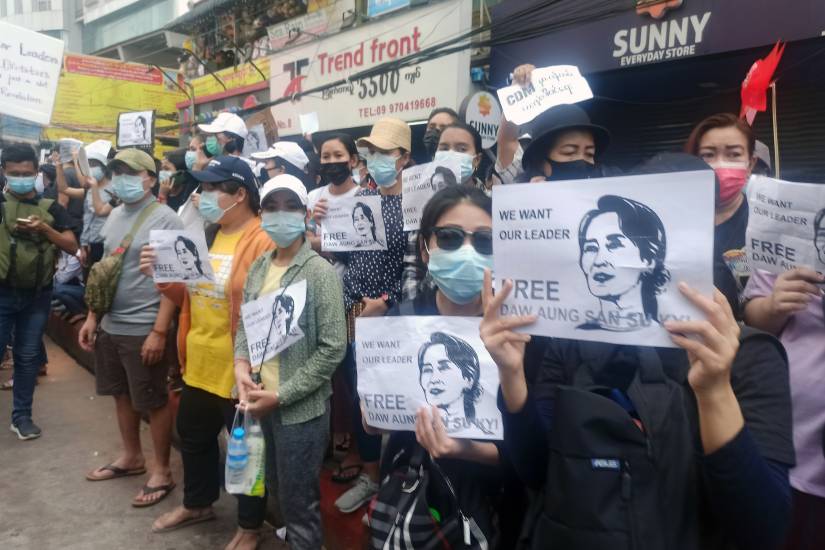
Image credit: Wikimedia Commons
Over the next five years, from 2015 to 2020, the relationship between the NLD-dominated civilian government and the military-run security apparatus was an uneasy one. Suu Kyi and the NLD had inherited a country wracked by poverty and a country with multiple religious and ethnic fault lines, exemplified by a 60-year conflict with ethnic minority groups—the modern world's longest-running civil war. With the security apparatus outside her control, Suu Kyi tried to cooperate with the military and supported many of its actions. This came into full view during the violent military-led pogroms against the Rohingyas, a Muslim ethnic minority in northwestern Rakhine state, and the expulsion of almost 1 million to neighboring Bangladesh. UN investigators considered the actions were taken with "genocidal intent," but Suu Kyi defended the military's actions in front of the International Court of Justice, arguing they were justified and an internal security matter. Despite these efforts, her personal relationship with the head of the military, Senior General Min Aung Hlaing, remained prickly, and it was this contentious relationship between the heads of the civilian and military arms of Myanmar's government that spilled over in late 2020 and early 2021.
What set off the coup that we see now?
In November 2020, in the middle of the pandemic, Myanmar held its general election in which the NLD not only swept into power, but it commanded an even bigger majority than it did in 2015. Of 476 seats contested, the NLD won 396—an 83% majority. The military-sponsored USDP won only 33 seats—less than 7% of the total. The Carter Center, which fielded an observation mission despite the pandemic, deemed the election free and fair.
But almost as soon as the results were announced, the military called the elections fraudulent, and the USDP asked for a recount under the supervision of the military. Between late November 2020 and January 2021, the military's rhetoric gradually escalated. Just a few days before the coup, General Min Aung Hlaing's spokesperson said that a coup could not be ruled out, and the general himself stated that the constitution could be revoked. The military was clearly signaling its intention of a takeover several days before the coup actually took place. Some speculate that personal motivations lay behind General Min Aung Hlaing's actions. His term as military chief was to end this July, and he may have wished to restore his post-retirement political ambitions that had been dashed by the election results.
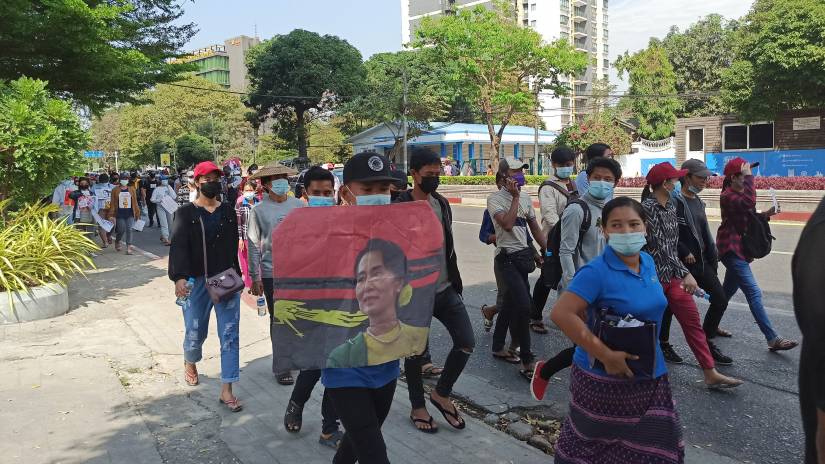
Image credit: Wikimedia Commons
The coup unfolded hours before the new parliament was to be sworn in. The newly elected parliamentarians and their political leaders were in the capital, Naypyidaw, for the new parliament's inauguration. The detention of Aung San Suu Kyi and Myanmar's president, Win Myint, together with cabinet ministers, chief ministers of several regions, other politicians, writers, and activists, was undertaken with precision and involved coordination across the country. The military declared a state of emergency initially for one year—as allowed under the constitution. Of course, the last time the military seized power, they remained in power for 49 years. So it's no guarantee that they will give up power in a year's time and allow democracy to return. We will have to wait and see what happens.
What are the ripple effects of an event like this in the region?
More important than the ripple effects across the region are the potentially disastrous effects of the coup to the economic and political fabric of Myanmar. The country's economy was already reeling from the effects of the pandemic. Incomes have plummeted, poverty has increased, and hunger is once again widespread. Tourism and trade have taken a hit, pandemic-related lockdowns have hurt small businesses, and lower commodity prices have added to the economic pain. In the past, the military has proved to itself to be incompetent in economic management. Foreign investors, already wary of Myanmar's chronic instability, will put any investment plans on hold, and those in the country could pull out. Multilateral institutions such as the World Bank, the IMF, and the Asian Development Bank are also likely to freeze their programs and loans for the time being.
A big concern is whether there will be violence or a public backlash against the military. Anticipating the coup, Suu Kyi, in a prepared statement, called for nonviolent opposition, but the country is like a tinderbox and a small incident could lead to conflagration. As important, there's every possibility that ongoing conflicts against ethnic armed groups could escalate. The crackdown on any dissent will undoubtedly extend to border states that are dominated by ethnic minorities, raising the risk of intensified conflict.
What are the international ramifications?
Myanmar occupies a strategic location in Southeast Asia, which is why it has been the focus of attention by the great powers—especially those in Asia, such as China, Japan, and India. China is not only a giant neighbor, but it has important strategic energy, infrastructure, and natural resource investments in the country. Its efforts to exert influence on Myanmar, however, have failed to make much progress. The coup may change this.
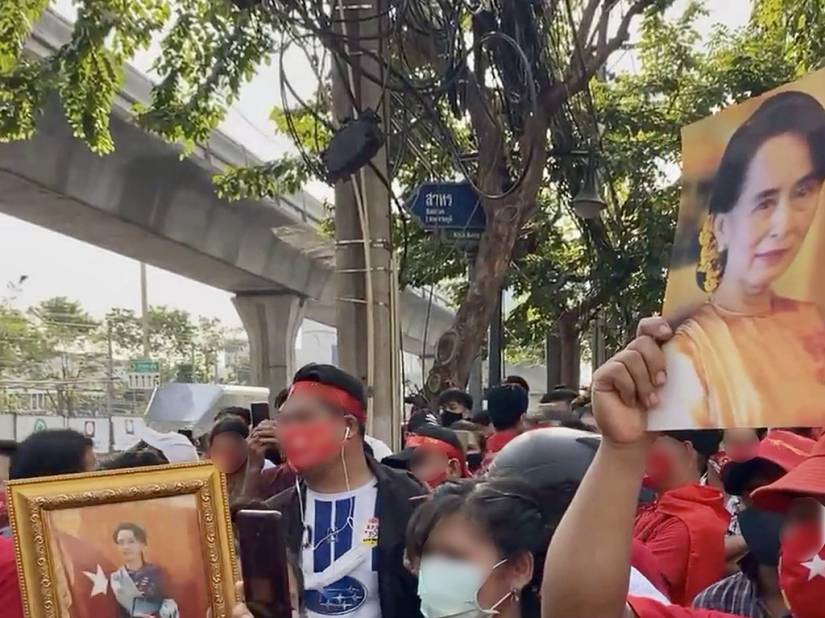
Image caption: In Bangkok, Thailand, protesters call for the release of Aung San Suu Kyi
Image credit: Wikimedia Commons
Myanmar's military is xenophobic—it harbors deep suspicions about the West as well as China. But if the West punishes the Myanmar military for its latest action, there is every possibility that the military authorities would have little choice but to turn to China for support. So the future of Myanmar-China relations depends to some extent on how the West handles its relations with Myanmar.
Having said that, the reality is that the neighboring Chinese province that adjoins the border with Myanmar, Yunnan, will continue to support cross-border investment by private and state enterprises in Myanmar's northeastern resource-rich ethnic states. Those investments have grown in recent years, quite often in partnership with the local military authorities, who now hold even greater power.
The other bilateral relationship that could conceivably strengthen as a result of the coup could be with Thailand. Thailand is a democracy in name only, and is essentially run by the military. Given similar authoritarian regimes in these two neighboring states and a range of mutual interests, this is a bilateral relationship that bears watching in coming weeks and months.
Japan is the other key Asian country that has large strategic and economic interests in Myanmar. Interestingly, it maintained a foothold in the country even during the darkest days of the military junta and was therefore well placed to expand its support following the political and economic reforms post 2010. It has been muted in its criticism of the recent coup and is likely to be an important interlocutor in any diplomatic effort that the international community may mount.
The Association of Southeast Asian Nations—the subregion's multilateral organization which includes Myanmar as a member—in its role as convener, could also be a useful, non-threatening channel of communication with Myanmar's new military regime. But its foundational policies of noninterference and consensus-based decision making will prevent it from playing an influential role. The reality is that Myanmar's coup is consistent with democracy's broader retreat in Southeast Asia, so few Southeast Asian countries, if any, will condemn the coup.
As for the United States, President Biden has already announced that his administration is considering actions and options in light of the developments in Myanmar, and further sanctions could be one possible outcome. But the administration has many highly experienced Southeast Asia specialists who recognize that sanctions, while playing well to a domestic American audience, are unlikely to have much influence on the new government and, indeed, may push it into the arms of China. So the United States, together with the European Union, have few effective options they can exercise bilaterally, and have to seek broader international coalitions to pressure the new Myanmar government diplomatically and in other ways.
What will you be paying attention to in Myanmar in the coming days, weeks, and months?
One thing that bears watching is the possibility of violence not just in the major urban centers of Yangon and Mandalay but also in the conflict-prone ethnic states in the northern and western parts of the country. One somewhat remote possibility is that the military itself could fracture, in which case the instability in the country could spiral out of control with devastating consequences. Let's hope that does not happen. But even if the military remains unified, the outlook for possible violence is grim. The military's consolidation of power, the closure of media outlets, and the absence of any organized political opposition have made those in power even less accountable than they were earlier, and therefore more likely to adopt disproportionately aggressive reactions to any sign of resistance. And any eruption of armed conflict will give the military an excuse to trumpet its oft-repeated message that it remains the sole guardian of the country's unity and integrity.
Another worry is the pandemic raging through the country and its devastating impact on the economy. As I noted before, the military's track record on economic management was abysmal in the past. But even if it became miraculously competent, the government has few resources available to deal with the pandemic, and has so far relied heavily on those offered by the international aid and donor community. The imposition of the emergency and the incarceration of Suu Kyi and the NLD leadership will make it impossible for the international community to continue its economic support. This will exacerbate the already severe hardships faced by the Myanmar people, especially the poor in urban and rural areas. And the economic gains made over the last decade, including the creation of thousands of micro, small, and medium enterprises that form the economy's backbone and generate most of its employment, are all in jeopardy. In addition, Myanmar's economic challenges, the impoverished state of government finances, and the retreat of Western aid and donor institutions will create a strategic vacuum that could possibly be filled by China. China's competent handling of the pandemic, the rapid recovery of its economy, and its vaccine diplomacy will all be factors that could position it well to respond to any overtures by an embattled Myanmar military leadership.
Posted in Voices+Opinion, Politics+Society
Tagged myanmar, international studies, q+a, southeast asia




